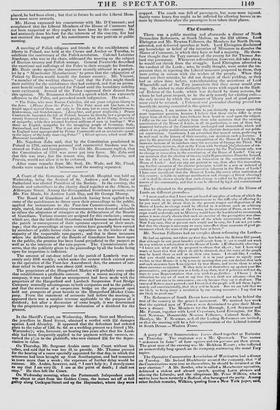A meeting of Polish refugees and friends to the establishment
of liberty in Poland, was held at the Crown and Anchor on Tuesday, to celebrate the anniversary of the Polish revolution. Colonel Leicester Stanhope, who was in the chair, addressed the meeting on the subject of Russian tyranny and Polish wrongs. General Dwernicki described the exertions and sufferings of the Poles in their struggle for freedom. Mr. Beals spoke against the argument recently adduced in a pamph- let by a " Manchester Manufacturer," to prove that the subjugation of Poland by Russia would benefit the former country. Mr. Vincent, "a member of the working classes," said that the Poles might thank their nobility for the misfortunes they had endured, and that no perma.. neat benefit could be expected for Poland until the hereditary nobility were extirpated. Several of the Poles expressed their dissent from this opinion. 111r. Beaumont delivered a speech which was extremely offensive to the Poles, and provoked much indignation. He said- " The Pules, who were Roman Catholics, did not grant religious liberty to the Jews. ( Hisses from the Poles.) The Poles must not hiss here, or he would appeal against them, not only to the men, but to every Englishwoman, Irishwoman, and Scotchwoman. (.Laughter, and great Confusion.) Prince Czartoryski lamented the fall of Poland, because he thereby lost a property of twenty thousand slaves. Were such people, he asked, fit for liberty, or worthy of sympathy, while they retained fourteen millions of men in bondage ? Was there no English sympathy for the struggling people of Germany, Italy, Switzerland, and France? Was it not also true that the subscriptions raised in England were appropriated by Prince Czartoryski and an aristocratic synod, to the injury of the really deserving Poles? " ( Great uproar, which made Mr. Beaumont inaudible.) Mr. Napoleon Zaba said, that by the Constitution proclaimed in Poland in 1791, extensive personal and commercial freedom was be- stowed on Poles and foreigners. To this Mr. Beaumont replied, that the Constitution of 1791 was never put into force. Mr. Zaba said that this was true; but the reason was, that Russia, Austria, and Prussia, would not allow it to be enforced.
After some remarks from Mr. Saul, Dr. Wade, and Mr. Flood, thanks were voted to the Chairman, and the meeting separated.


























 Previous page
Previous page